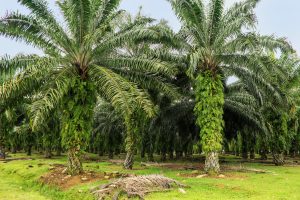The United States has agreed to exempt key Indonesian agro-industrial exports from the 19 percent tariff imposed by President Donald Trump earlier this month, according to a senior Indonesian minister.
In an interview with Reuters, Coordinating Minister for Economic Affairs Airlangga Hartarto, who is leading Indonesia’s trade negotiations with the Trump administration, said that exemptions for cocoa, palm oil, and rubber exports to the U.S. had been discussed in a recent meeting.
“We are waiting for their response, but during the meeting, basically, the principal (exemption) has been agreed for products not produced in the U.S., such as palm oil and cocoa and rubber,” he said, adding that the tariff rates on these goods “will be zero or close to zero.”
On July 15, Trump announced that his team had struck a deal with Indonesia, lowering its tariff from the 32 percent announced by Trump in April to 19 percent – the same rate offered to Thailand, Cambodia, and Malaysia, and 1 percent lower than the rate imposed on imports from Vietnam. The following week, the two nations issued a statement announcing that they had “agreed to a Framework for negotiating an Agreement on Reciprocal Trade to strengthen our bilateral economic relationship, which will provide both countries’ exporters unprecedented access to each other’s markets.”
Under the agreement, Indonesia agreed to remove “approximately 99 percent of tariff barriers for a full range of U.S. industrial and U.S. food and agricultural products,” in exchange for the tariff reduction. During the negotiations with Washington, Indonesia also reportedly agreed to buy $15 billion of U.S. energy products, $4.5 billion of American farm products, and 50 Boeing jets.
But like the U.S. tariff deals with Vietnam, Malaysia, and Thailand, the arrangement left a lot of details to be filled in. Among these are the array of non-tariff barriers that the U.S. claims have contributed to its $17.9 billion trade deficit with Indonesia, and the vexed issue of transshipment – the routing of Chinese goods via Indonesia to evade existing U.S. tariffs. The joint statement also said that the U.S. “may also identify certain commodities that are not naturally available or domestically produced in the United States for a further reduction in the reciprocal tariff rate.”
Based on Airlangga’s comments, it now appears that Washington has agreed to carve-outs of three of the country’s leading agro-industrial exports. The most important of these is palm oil, of which Indonesia is the world’s top producer. The country exported 29.5 million tonnes of palm oil products in 2024. Of this, around 2.2 million tonnes, went to the United States, according to the Indonesian Palm Oil Association. Indonesia accounts for about 85 percent of U.S. palm oil imports.
If confirmed, the question will arise as to whether Malaysia, Indonesia’s main competitor in the global palm oil market, will manage to secure a similar exemption. Malaysia exported 191,231 tonnes of palm oil to the U.S. in 2024.
Airlangga told Reuters that any exemptions will take effect once Jakarta and Washington finalize their trade agreement, although the timeline is uncertain, given the number of trade deals that the U.S. government is currently attempting to finalize with other nations.

































